Local Champion: Collectiva Concepción
Local Champion: Collectiva Concepción

Slow fashion brand Collectiva Concepción is dedicated to crafting luxury clothing while elevating and supporting the indigenous artisans its designs are dedicated to. The perfect partner, then, for Maroma: our authentic Mexican sanctuary.
Mexican clothing sparks joy. Colour, style, comfort, heritage—the loose flow of the traditional huipil tunic, the elegant drape of the serape shawl, painstakingly embroidered or woven with flowers, chevrons, zig-zags, lozenges. Since pre-Hispanic times, these garments have been created using a series of deft, complex techniques: the backstrap loom, pedal loom, drawn thread work, counted cross-stitches, brocading, gauze-weaving. Time and patience, skill and love.
Beloved Mexican artist, Frida Kahlo, belonged to the Mexicayotl movement that rose in popularity in the 1950s, which sought to revive the indigenous traditions of the region. In line with these beliefs, she was well known for her personal predilection for indigenous clothing, wearing her love for artisanal craft on her literal sleeve and helping popularize her country’s artistry on the global stage. Since 1400 BCE, Mexico has pioneered in the business of textiles: communities took home-woven cloth, manta, organdy, popelina and silk, and spun it into heritage gold.



Now, luxury fashion brands in Mexico are following suit. Enter Collectiva Concepción, launched by Concha Orvañanos in her native Mexico City in 2019, whose raison d'être is to take elegant modern design and infuse it with traditional Mexican artisanship. The result is a sustainable slow fashion line that empowers both the women who make the garments, and the women who wear them.
Speaking with Belmond, Orvañanos laid out her mission statement: “we always look for local materials for our fabrics to bring authenticity and a different touch to the garments. My lifelong dream is having clothes that identify Mexico, preserve its culture and represent its communities.” For Collectiva Concepción, the skills of these artisans are precisely what gives the garments value. “Craft is luxury because it’s hand made by masters and great craftswomen.”
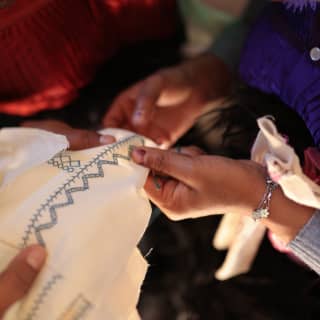
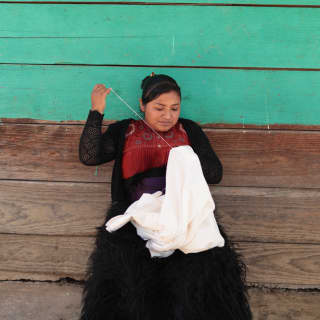
At this label you’ll find traditional techniques, but filtered through understated colors and clean lines, taking inspiration from the traditional structural shapes of Mexican design. Collectiva Concepción is more than beautiful clothing, however. Its existence is indebted to, and provides employment for, at-risk indigenous artisan communities, primarily supporting women-led micro-economies in Mexico—providing a viable economic outlet for their craft. By preserving the region's textile traditions, they channel Mexico’s artisanal heritage into timeless styles that women around the world can treasure as future heirlooms.
Indigenous peoples represent 6% of the world’s population, yet they are keepers of 80% of the world’s biodiversity. For them, living in harmony with nature is a fundamental part of their values, which is why they have developed sustainable, eco-friendly practices that allow the preservation of biodiversity. “Indigenous communities are very connected to the earth, and they’re the ones that take the most care of nature, animals, flora and fauna,” Orvañanos explains. “It is a pleasure for me to be able to work with such amazing people, and to help build a better country and planet.”
There are 5 million indigenous artisans in Mexico, of which Collectiva Concepción employs around 230. The label pays these craftspeople, mostly women, 170% higher than the minimum wage, and gives them the flexibility to work from home as they care for their families or work communally. Not only does centralizing Collectiva’s supply chain entirely in Mexico create a positive environmental impact through a reduced carbon footprint, Collectiva’s support of Mexican artisans, which includes donating a percentage of sales on top of their salary, also ensures that these traditional skills—passed down from generation to generation—won’t be lost.
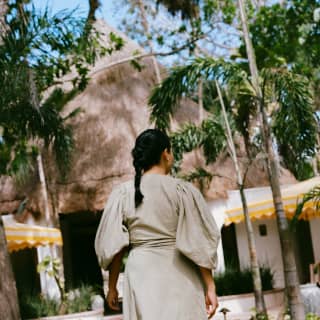
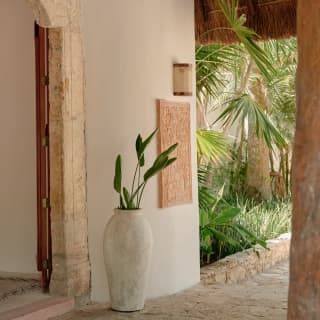
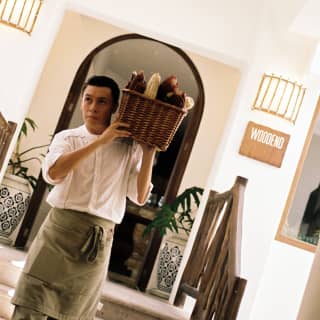
Maroma, A Belmond Hotel, Riviera Maya, re-opened in August 2023 after a two-year refurbishment project. This authentic Mexican oasis was designed and crafted according to timeless, sacred principles and traditions, with a focus on sustainable travel—and so a partnership with Collectiva Concepción, who have designed the staff uniforms, feels only natural.
In the stunning textiles created for Maroma, Concepción Collectiva used local materials to bring authenticity to the garments. The result is clothing that celebrates Mexican diversity, culture, and heritage. The uniforms are constructed from cotton linen and manta, which is known as the most traditional fabric in Mexico; it’s also an entirely eco-friendly fabric, being made of 100% pure cotton. Each uniform will have its unique story to tell, made from unraveled fabric from a small community, San Felipe de los Herreros in Michoacán, with embroidery from women in communities in Chiapas.
From restaurant hostesses to spa managers, concierge to the sommelier, each member of staff will fully live their country’s heritage through their clothing. In line with Maroma’s design DNA and the land we are proud custodians of, the uniforms will come in hues of rich green, umber and neutral sand. The label has also sourced a selection of vintage photographs, ascribing each staff member a specific inspiration from the past, often incorporating a distinctive use of bandanas and prioritizing comfort. The result is an elevated and curated capsule collection that is timeless and understated, but bursting at the seams with tiny, meaningful details.
Collectiva Concepción shares Maroma’s desire to imagine an earthly, artisanal place—a space with a sense of roots. A place that imagines and builds heritage for the future.
Delve deeper into
You might also enjoy
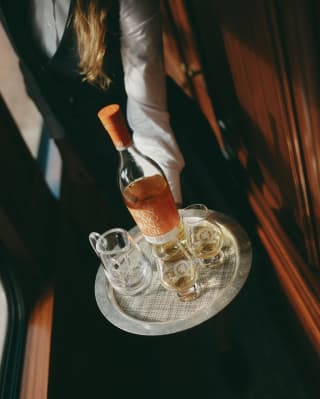
The Lingo to Know When Ordering Scotch Whisky
Whisky might be smooth, but knowing which one to order can be anything but. Millie Milliken, award-winning spirits writer and head of content for OurWhisky Foundation – a non-profit that lifts women in the global whisky industry – provides an expert guide to make sense of it when you see it on a menu.
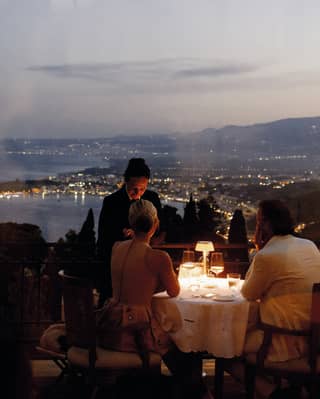
Guide: Belmond's Michelin Star Restaurants
From gold-plated dining overlooking the Venetian lagoon to pan-Asian elegance in the heart of Rio, Belmond is proud to offer some of the best Michelin-star restaurants in the world.
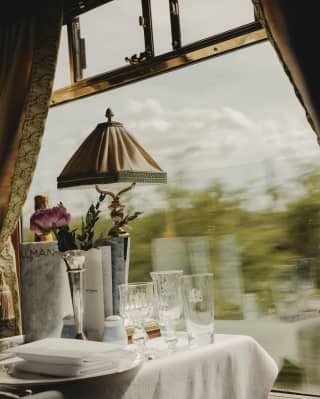
Four Chefs on the Meaning of Modern British Food
From April to October 2025, our iconic train reunites with star chefs Theo Randall, Atul Kochhar, Phil Howard and Andrew Wong for the relaunch of the Celebrity Chef Dinners series. Today, join our special guests to find out what modern British food means to them and how together, we celebrate the diversity of Britain’s culinary scene.
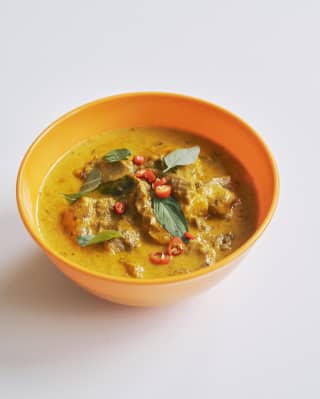
Recipe: André Chiang’s Penang Duck Curry
In our second Belmond and Apartamento book, ‘Penang: Recipes & Wanderings Around an Island in Malaysia’, we disembark in Georgetown along with acclaimed chef André Chiang. Among his storied anecdotes and rich lessons on local cultures, the Taiwan-born culinary curator of the Eastern & Oriental Express tells us all about a staple of Malaysian cuisine – the duck curry dish.

Say ‘I Do’ to the Micro-Wedding
With the rise of the boutique wedding and minimony, that doesn’t mean you can’t have a day full of luxury and tradition. Here's why smaller celebrations at Belmond are having their moment.

Tennis Courts, By Belmond
From serving aces in the middle of Knightsbridge to match points overlooking the Italian Riviera’s azure waters, discover our best hotel tennis courts.

Ambient Films: The New Mindfulness?
In a world dominated by short, snappy videos vying for our attention (the span of which, let’s face it, is ever shrinking), long-form ambient films on YouTube have become the ultimate antidote. As Belmond’s slow TV series ‘Long Shots’ launches – taking you to diverse destinations, from Rio to Portofino – we take a closer look at this slow media phenomenon.